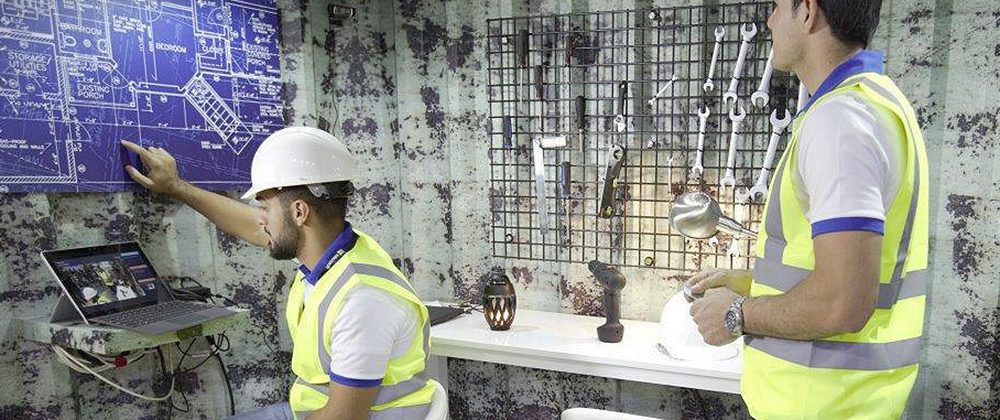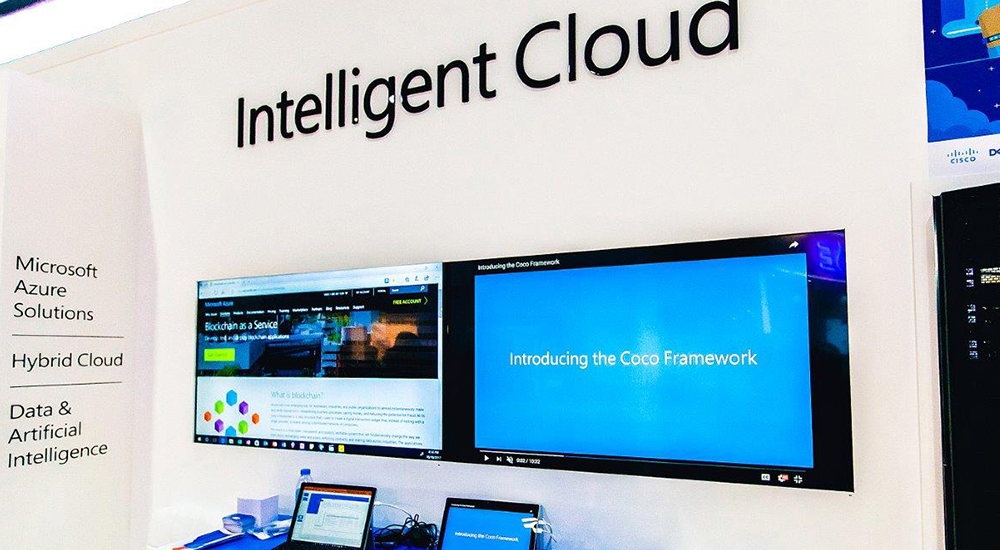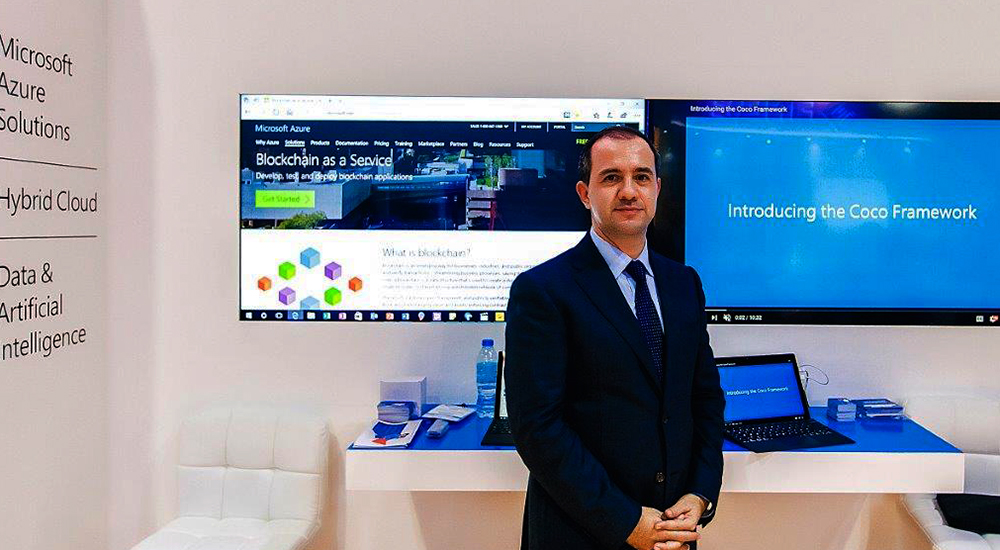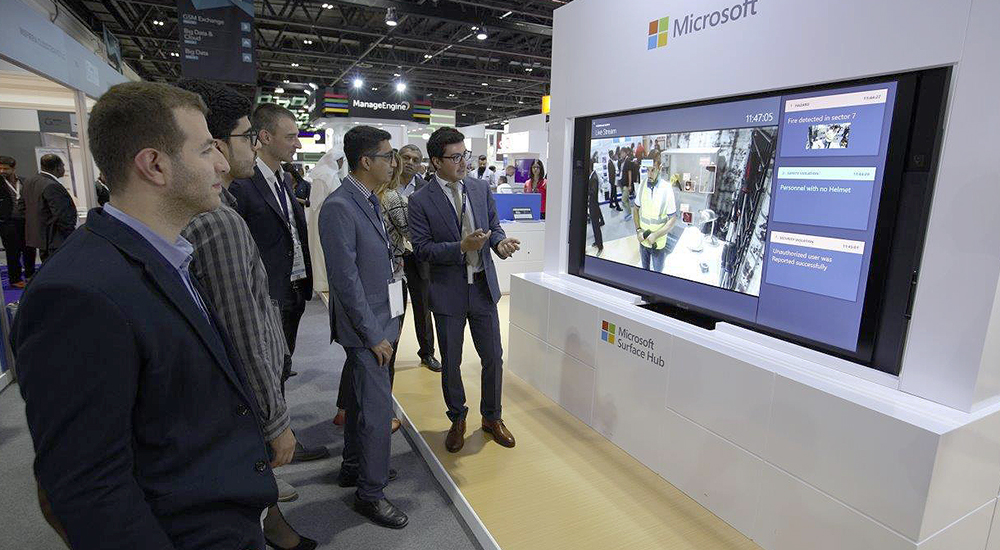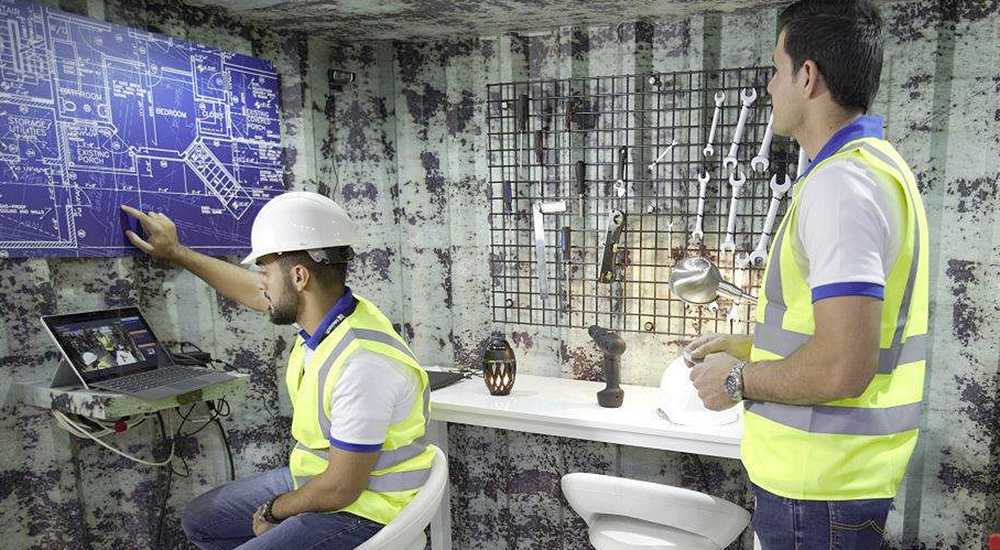Microsoft introduced Gitex delegates to its Workplace Safety demonstration, built on the company’s Cognitive Services platform, with significant contribution from its artificial intelligence capabilities to deliver workplace safety. Using existing commodity cameras, and advances in artificial intelligence, the workplace safety solution brings the digital and physical worlds together to help make everyone more safe, secure and productive. The demonstration showed visitors how any existing CCTV camera can be transformed into a safety and security tool, by the perfect union of the intelligent cloud and artificial intelligence capabilities.
The demonstration was built around a live feed from a staged workplace setting, and focused on a series of scenarios, revealing how the artificial intelligence vision, deep learning tool and cloud computing can enable organisations to apply business policies that recognise the relationships between people, places and things and ultimately turns these places into artificial intelligence-driven safety zones. That technology and platform can enable similar solutions in areas where safety is a top priority from hospitals to petrol stations and manufacturing plants.
“As the UAE continues to have a strong tradition in heavy industry, from steel and chemicals to ship-building and aerospace – workplace safety is becoming a top priority,” said Sayed Hashish, Regional General Manager, Microsoft Gulf. “Microsoft has long been at the forefront of the Fourth Industrial Revolution, where the lines between the digital and physical world are being blurred by technologies such as the Internet of Things and artificial intelligence. Gitex is an ideal venue for us to showcase our Cognitive Services platform and extraordinary source of innovative solutions, ushering the workplace into a new era.”
The manufacturing sector is now Dubai’s third largest, and the emirate’s Department of Economic Development expects around $19 million to be spent on research by manufacturing companies, as the sector expands from a current value of $11.2 billion to $16.1 billion by 2030.
Attendees watched a live artificial intelligence-powered chatbot act as a security and safety officer identifying in unauthorised personnel, objects and safety threats while providing real-time alerts for necessary actions. The demonstration also covered safety-monitoring, showcasing how you can automatically detect threats such as fire, and workers not wearing the appropriate protective gear. The solution demonstrated how people in the real world can take action in real time to improve safety and well-being. That demonstration can be easily expanded to identify objects placed in hazardous positions or do asset tracking.
For example, in an event of a dangerous spill in a chemical plant, cameras can automatically recognise the incident and information about the spill would be shared with people who need it the most, enabling them to protect other employees from coming in contact with the hazard.
Although, for the purposes of demonstration, Microsoft representatives staged the scenarios in an environment made to resemble a construction site, delegates also gained insights on the applicability of the Cognitive Services and Deep Learning solutions across a broad range of industries, worksites and warehouses, including hospitals, banks, petrol stations and supermarkets.
Built with the Microsoft Cognitive services platform, the workplace safety solution also showcased its use in scenarios where people who need special tools, are spread out across multiple areas or floors of a site. With the use of intelligent cloud, the cameras can identify a specific tool, as well as the closest authorised person who can deliver it, saving everyone time and keeping the workflow moving.
Microsoft’s Workplace Safety Demo showed attendees how organisations can tap into the advancement in its Cognitive Services Platform to optimise operations and empower employees, by reducing workplace incidents and streamlining compliance monitoring.
“Our mission at Microsoft is to empower every person and every organisation on the planet to achieve more,” said Hashish. “We have been proud to participate in Gitex over the years and try to address the issues that matter most to our regional partners. As Dubai, the wider UAE, and indeed the entire GCC, expands their heavy industry sectors, safety will become a prime concern. But other sectors should also consider that the intelligent cloud is capable of making any workplace safer and more secure.”
Blockchain analysis also featured heavily on the agenda of Gitex Technology Week, with experts from across the globe on hand to advise regional organisations on the potential for securing audit trails. Microsoft’s announcement follows its commitment in July this year to the Dubai Future Foundation’s Global Blockchain Council.
Starting life as a means to build credible and secure audit trails for the digital currency bitcoin, blockchain has become popular among organisations looking to maintain trustworthy transaction records. Blockchain architecture distributes data on asset ownership and critical transactions across trust boundaries, so that no one site holds the information exclusively. Such transparency is vital in protecting trust-centric data flows, such as those of financial institutions.
“Investment in blockchain, across the GCC and beyond, is reaching fever pitch, as organisations recognise it as a digitally transformative tool, so we felt that Gitex 2017 was the perfect venue for introducing Coco to the region,” said Necip Ozyucel, Cloud and Enterprise Business Solutions Lead, Microsoft Gulf. “Microsoft joined the Global Blockchain Council because we believe strongly in the security of the technology’s auditing capabilities. But blockchain can achieve so much more for enterprises of all scales and walks of life. It allows them to share business processes with suppliers, customers and partners, leading to new opportunities for multi-party collaboration and, eventually, exciting new business models.”
At the launch of the Global Blockchain Council in July, the Dubai Future Foundation cited studies that predict the global market for digital transactions will reach $9.5 billion by 2021. During the same period, worldwide investments in blockchain technology are expected to surpass $300 billion.
As more and more blockchain protocols have emerged, enterprises have noticed that many fall short on critical compliance requirements, such as performance, confidentiality and governance. While public blockchain networks require trade-offs between, for example, confidentiality and performance, the Coco Framework eliminates these trade-offs by catering specifically to confidential consortiums, where participants in the blockchain network are explicitly declared.
Based in the intelligent Azure cloud, Coco enables high-scale, confidential networks that meet all key enterprise requirements, providing a means to accelerate the digital transformation potential of blockchain technology.
Coco uses existing blockchain protocols, trusted execution environments such as Intel SGX and Windows Virtual Secure Mode, distributed systems and cryptography, to deliver a platform for enterprise-ready ledger solutions. The framework’s capabilities include database-level throughput and latency; richer, more flexible, business-specific confidentiality models; network policy management through distributed governance; and support for non-deterministic transactions.
Coco is open, and compatible with any blockchain protocol. Microsoft has already begun to integrate the open-source Ethereum into the framework, as well as JP Morgan Chase’s Quorum, IBM’s Hyperledger Sawtooth and R3’s Corda, with other ledgers to follow in the coming months.
“Our mission at Microsoft is to help every person and organisation on the planet to achieve more,” said Ozyucel. “Gitex has always been a platform for airing the current issues facing technology professionals in the region and beyond. In 2017, blockchain is front and centre among those concerns. We believe Coco will benefit greatly from its open-source philosophy, as GCC organisations will benefit greatly from adoption of blockchain.”


